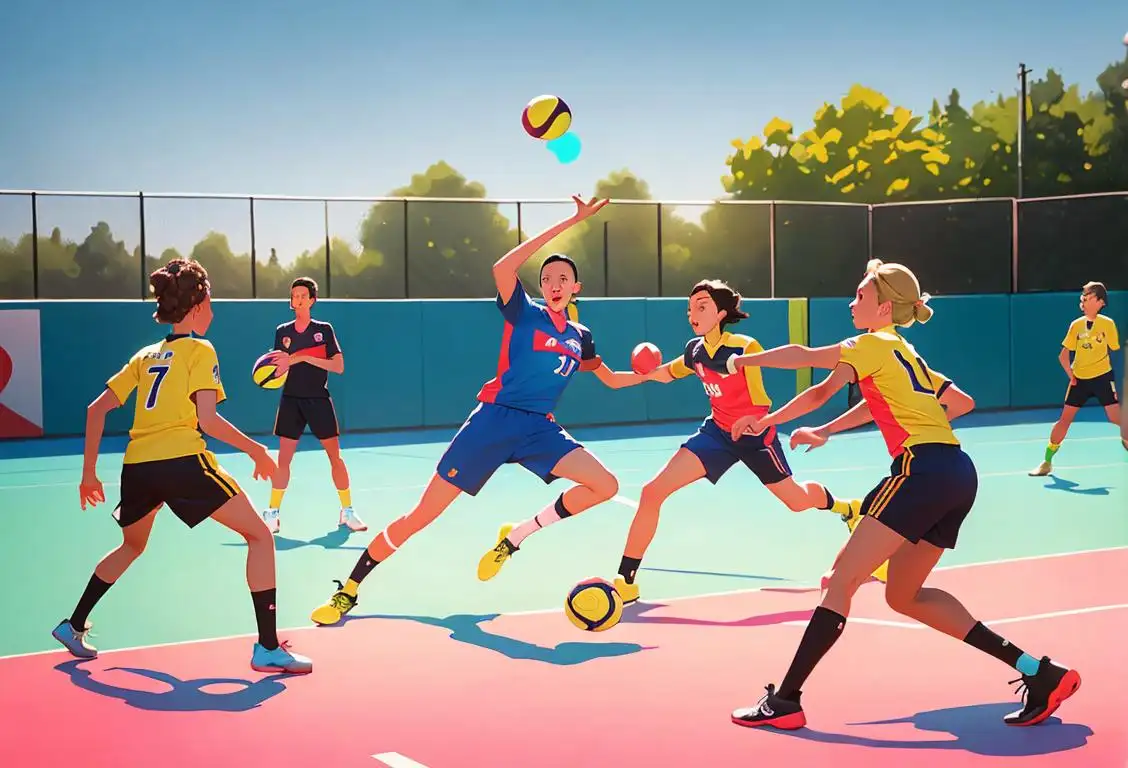National Handball Day

Happy National Handball Day! Get ready to score some goals and show off your hand-eye coordination. This day is all about celebrating the fast-paced and action-packed sport of handball. So, grab your team, lace up your shoes, and let's dive into the history and excitement of National Handball Day!
When is Handball Day?
It's national handball day on the 8th July.
A Brief History of Handball
Handball, also known as team handball or Olympic handball, is a thrilling sport that combines elements of basketball, soccer, and water polo. It originated in Northern Europe, where it was played outdoors on grass or gravel fields. The game quickly gained popularity and evolved into the indoor version we know today.
The modern form of handball was first played in the late 19th century in Denmark, Germany, and Sweden. It was officially codified in 1906 and the International Handball Federation (IHF) was established in 1946 to govern the sport globally.
Handball made its Olympic debut at the 1936 Berlin Games but didn't become a regular Olympic sport until 1972. Since then, it has captured the hearts of sports enthusiasts all over the world. National Handball Day provides an opportunity to cherish the sport and recognize its impact on athletic communities.
Celebrating National Handball Day
On National Handball Day, handball enthusiasts come together to share their love for the sport. Here are some fun ways you can celebrate:
- Organize a friendly handball tournament with your friends or colleagues.
- Host a handball-themed movie night and watch films that feature the sport.
- Create handball-inspired artwork or crafts.
- Learn about the rules and tactics of handball through online resources.
- Support your local handball team by attending their matches.
Did You Know?
Did you know that handball is played in over 180 countries? It's a truly global sport with a massive fan base and dedicated players all around the world. The popularity of handball continues to grow, making National Handball Day an important occasion to celebrate this fantastic sport!
History behind the term 'Handball'
1906
Introduction of the term
In the year 1906, the term 'handball' was first introduced. It originated from Germany as a direct translation of 'Handballspiel' which means 'handball game' in German. This new game involved players using their hands to hit a ball against a wall and was initially played outdoors as a pastime activity.
1917
Formation of the International Amateur Handball Federation (IAHF)
In 1917, the International Amateur Handball Federation (IAHF) was founded with the aim of promoting and governing the sport of handball worldwide. This marked a significant step in the formalization of handball as an organized sport. The IAHF established rules, standardized equipment, and facilitated international competitions, paving the way for the global growth of handball.
1936
Inclusion in the Summer Olympics
Handball gained widespread recognition in 1936 when it was included as a demonstration sport in the Summer Olympics held in Berlin, Germany. Although it was not an official part of the Olympic program at that time, its presence helped to increase popularity and awareness of the sport on a global scale.
1946
The emergence of team handball
In 1946, a new version of handball known as 'team handball' was developed. This variation of the game allowed for a greater number of players on each team and introduced specific positions and tactics. Team handball quickly gained popularity, particularly in Europe, and became the predominant form of handball played internationally.
1972
Inclusion as an official Olympic sport
The year 1972 marked a major milestone for handball as it was officially included as a competitive sport in the Summer Olympics held in Munich, Germany. This recognition as an Olympic sport further solidified handball's status and led to increased participation and interest worldwide.
1994
Formation of the International Handball Federation (IHF)
In 1994, the International Amateur Handball Federation (IAHF) changed its name to the International Handball Federation (IHF) to reflect its professional status. The IHF became the governing body for handball, overseeing the development, organization, and regulation of the sport at both the national and international levels.
Did you know?
Did you know that handball is played in over 180 countries?Tagged
fun sportsFirst identified
19th June 2015Most mentioned on
8th July 2015Total mentions
24Other days
Golf Day
Hunting And Fishing Day
Cancer Survivors Day
Fitness Day
Memorial Day
Gymnastics Day
Dance Day
Foundation Day
Jr Smith Day
Left Handers Day









